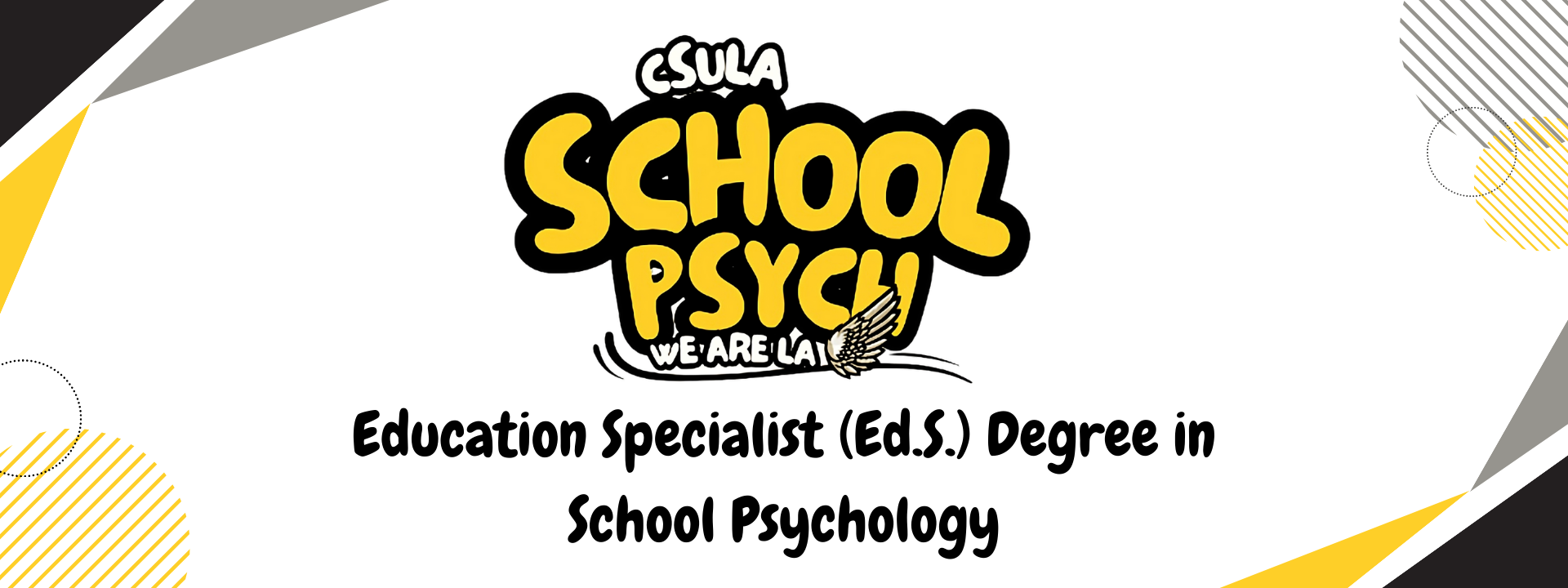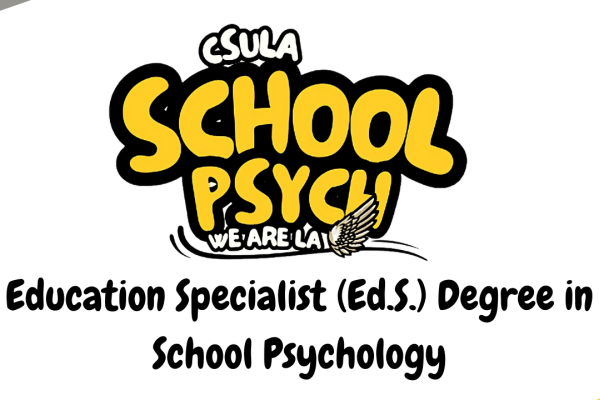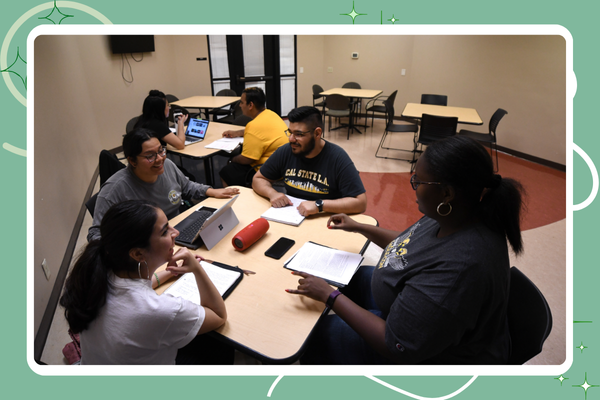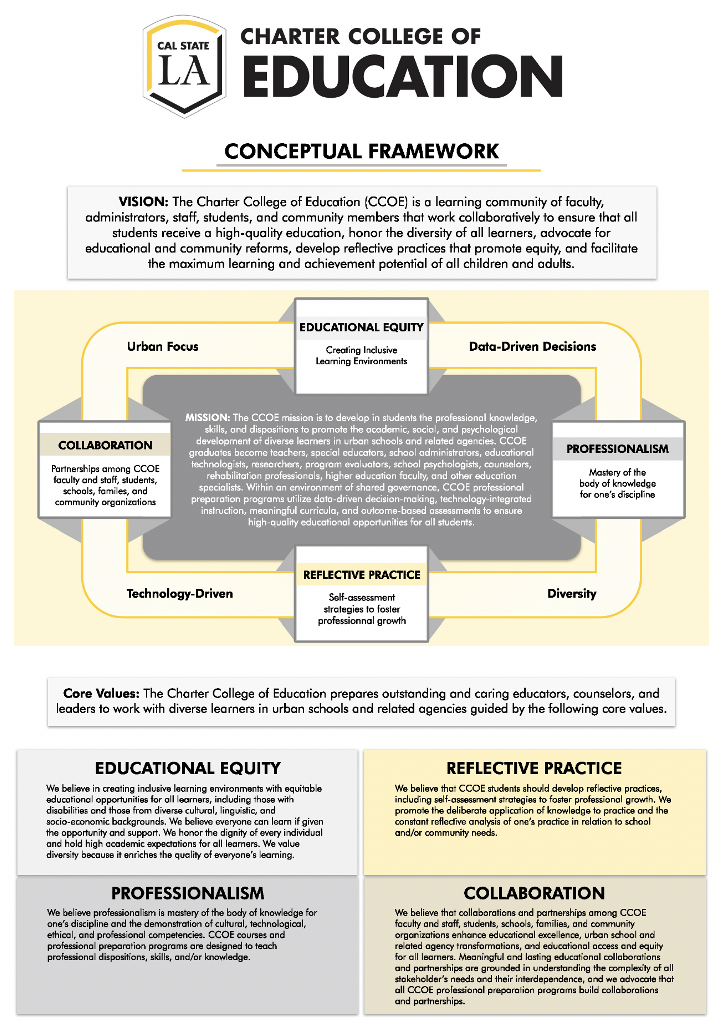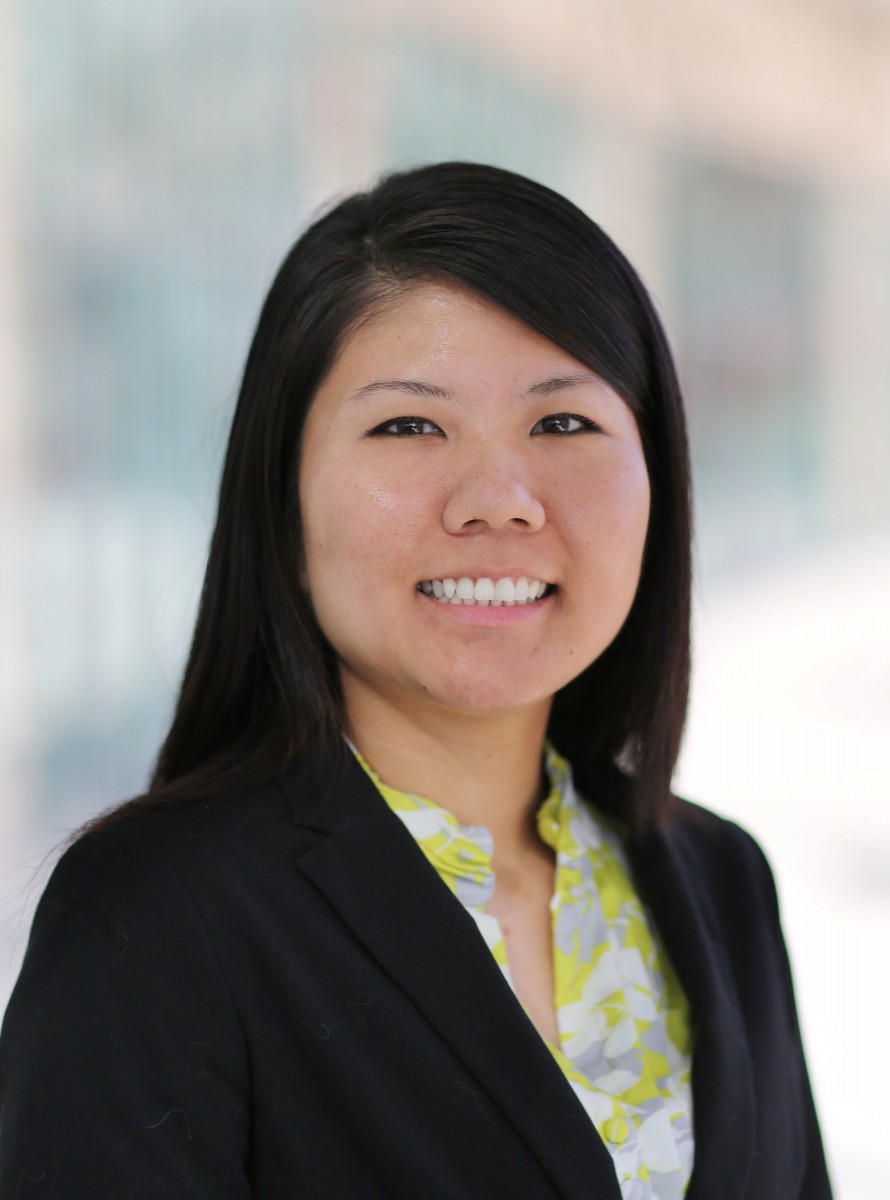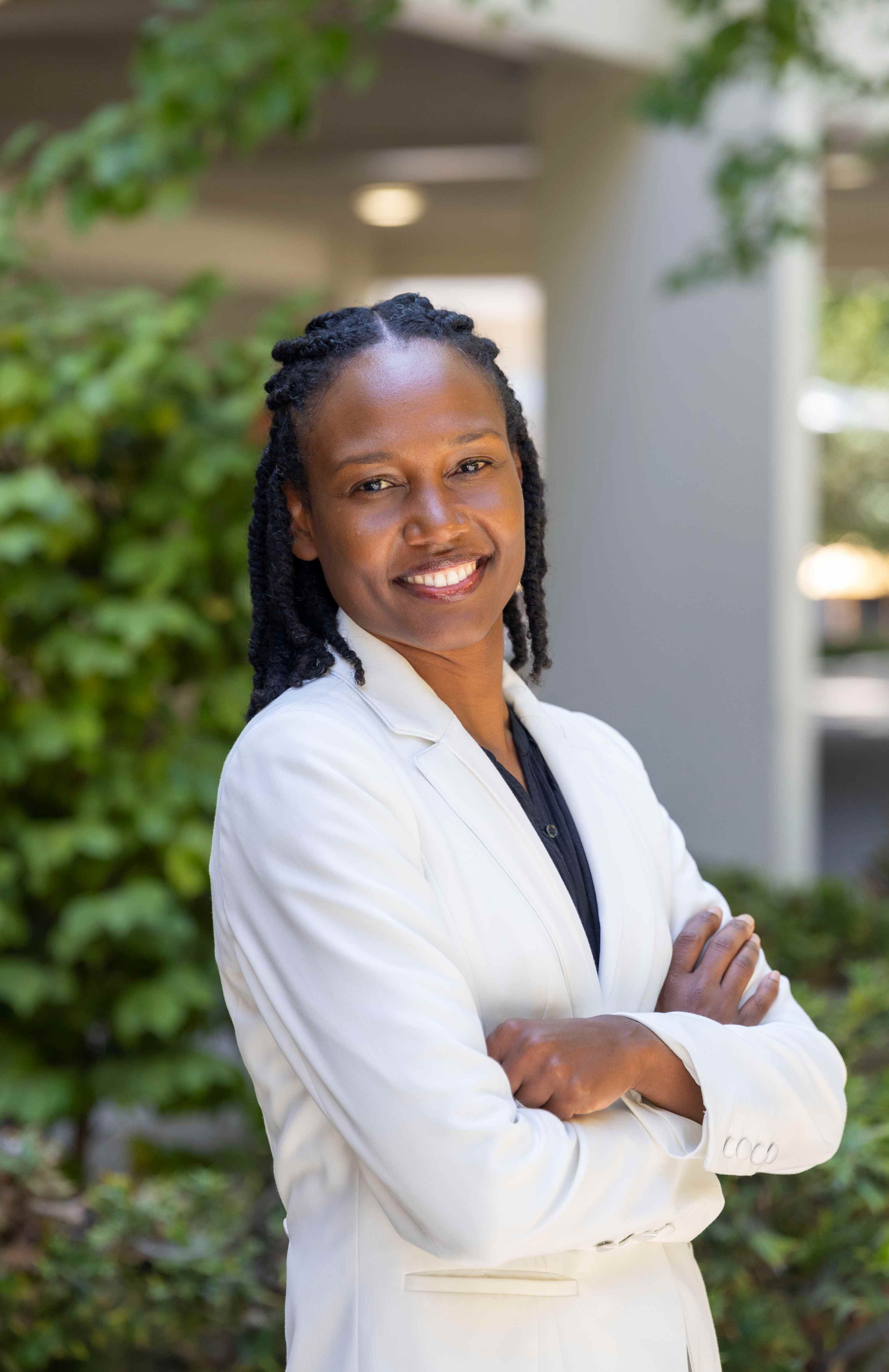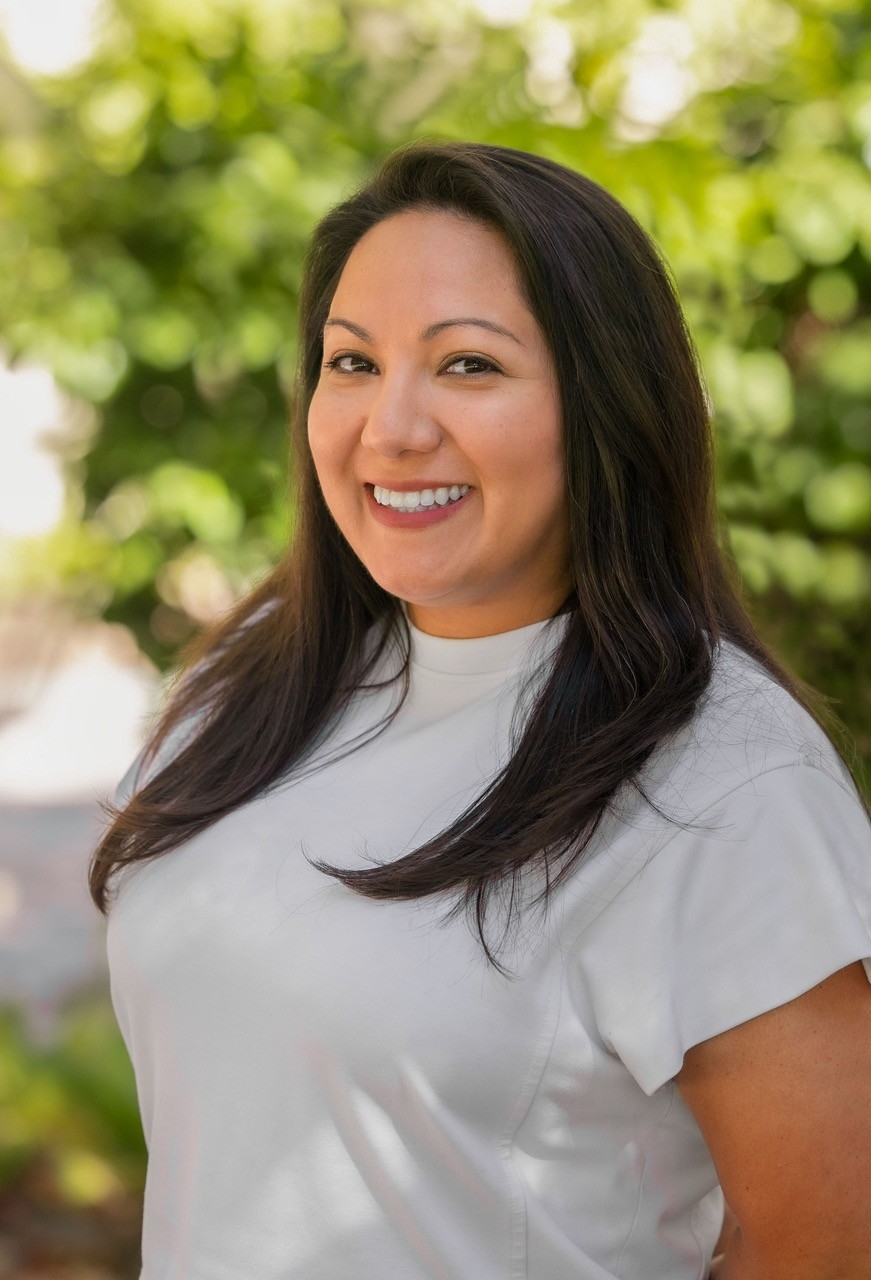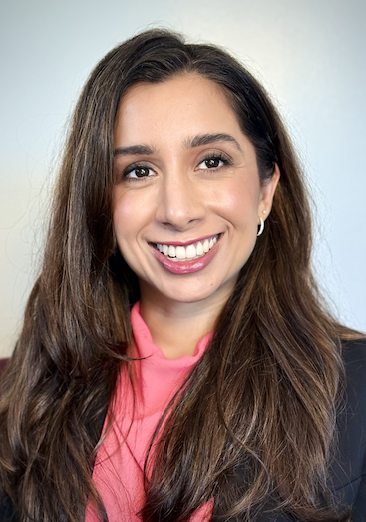Previously: Master of Science in Counseling: Option in School Psychology
The School Psychology Program at Cal State LA is a graduate program within the Department of Special Education and Counseling in the College of Education.
The mission of the School Psychology Program at Cal State LA is to facilitate complete access to the schooling process for ALL children, youth, and their families with recognition of their diverse, multicultural and linguistic backgrounds. The Master of Science Degree in Counseling, Option in School Psychology is designed for graduate students who plan to work as school psychologists who will focus on the psychoeducational development of individuals from birth to age 21, their abilities and potentialities, biological, emotional, behavioral, and cultural factors that influence the learning process. Candidates who earn the master’s degree with this option also qualify for the Pupil Personnel Services credential with Advanced Specialization in School Psychology and Advanced Specialization in Child Welfare and Attendance Services.
We offer a 3-year, full time program of study. Part time study options are not available. Students should expect most classes to be completed in the late afternoon to evening hours and to be on campus 2-4 days/week.
Explore Available Credentials
A career as a school psychologist is both impactful and versatile, blending mental health and educational support to serve students and families in diverse communities. This program provides the comprehensive training needed to pursue the California Pupil Personnel Services credential with Authorization in School Psychology and Child Welfare and Attendance—preparing graduates for meaningful work in schools and mental health agencies alike.
Learn about the Admission Process
If you're ready to make a difference in the lives of students and families, we’re here to help you get started. Whether you're advancing your current career or entering the field for the first time, our program is here to guide you. Explore the steps to apply and take the first step toward a meaningful future in school psychology.
Graduates of our School Psychology program obtain employment primarily in school districts and agencies in the Los Angeles area.

Start Your Journey Today
Are you ready to advance your career in school psychology? Don’t wait—start your application today and be part of a program that transforms lives!
Qualify For Credentials
Upon completing the Ed.S. degree, students not only gain a deep understanding of the field of school psychology, but also qualify for valuable credentials, including:
Pupil Personnel Services Credential
The Pupil Personnel Services (PPS) Credential authorizes any of the following specializations: school counseling, school social work, school psychology, and the additional authorization of child welfare and attendance services.
The specialization in School Psychology involves a wide range of responsibilities. School psychologists are authorized to provide services aimed at enhancing academic performance and design strategies and programs to address problems of adjustment. They also serve as consultants for other educators and parents, addressing issues related to social development, behavioral challenges, and academic difficulties. Additionally, school psychologists conduct psycho-educational assessments to identify special needs and offer psychological counseling services to individuals, groups, and families. They play a crucial role in coordinating intervention strategies for the management of both individual and schoolwide crises.
Advanced Authorization in Child Welfare and Attendance
An Advanced Specialization in Child Welfare and Attendance (CWA) Services is a specialized area within the Pupil Personnel Services (PPS) credential that focuses on supporting student well-being and success by addressing issues of attendance, student and family welfare, and truancy prevention and intervention.
This specialization equips students with the expertise to navigate the intricate landscape of child welfare and attendance services, allowing them to make a meaningful impact in this critical area.
For more information on the School Psychology Internship Credential and other program details, please reach out to the Department Office of Special Education and Counseling. Our program is committed to preparing future professionals who can positively influence the lives of children and young adults as they progress through their educational journeys.
Admissions
The Education Specialist in School Psychology Program welcomes applicants from a wide range of academic and professional backgrounds who are committed to become a school psychologist, a willingness and readiness to study on a full-time basis, an appreciation for cultural and linguistic diversity, excellent communication skills (oral and written), a desire to work with children and adolescents - including youth with special needs, good interpersonal skills, and shared values with the College of Education and Department of Special Education & Counseling.
No specific undergraduate major is required, and we welcome all majors to apply. Students who majored in an unrelated field who are successful in our program typically have at least some prior field experience in the helping profession (e.g., working or volunteering at a school setting or community youth agency, tutoring, ABA therapy).
No standardized tests (e.g., GRE) are needed to apply.
If you’re passionate about helping others and ready to begin a transformative journey in school psychology, we encourage you to apply!
Information Sessions
October 16, 2025 @ 3-4 PM, KH B1017, https://calstatela.zoom.us/j/87090724088
November 12, 2025 @ 5-6 PM, KH B1010, https://calstatela.zoom.us/j/87090724088
In addition to meeting the University's general requirements for admission to graduate programs, prospective students must fulfill the following criteria:
A baccalaureate degree or higher from a regionally-accredited college or university.
A 2.75 grade point average in the last 60 semester units attempted.
Two letters of recommendation.
Personal Statement.
Resume or Curriculum Vitae.
Participate in an interview with the Department screening committee.
Successful candidates who meet these requirements will be admitted to cohort groups and are obligated to follow a specific sequence of cohort classes.
Applications for admission to the program are reviewed once a year for the Fall Semester. Interested candidates should submit their applications through Cal State Apply. The School Psychology Program admits one new cohort of students annually, with classes commencing in the Fall semester. We typically receive 250-300 applications for 24 available positions. There are no specific undergraduate major requirements, and no standardized test (e.g., GRE) is needed. Applicants must go through the university application (CalStateApply). The School Psychology Program Admission Committee reviews applications, conducts in-person interviews for selected candidates, and requires all selected applicants to participate in a half-day campus interview in February.
After Admittance

After admittance, students are assigned a faculty advisor and placed in a cohort group.
Candidates are required to obtain Certificates of Clearance with the California Commission on Teacher Credentialing (CTC), provide proof of a negative TB test, and successfully meet the Basic Skills Requirement.
The School Psychology Program is a 3-year, full-time course of study consisting of 73 units. Students have classes 2-4 days a week. All of our courses are scheduled in the early afternoon or evening (starting at 3:05 PM or 4:30 PM). Part time study options are not available.
Program Accreditation
The Ed.S. in School Psychology Program is accredited by the National Association of School Psychologists and the Council for the Accreditation of Educator Preparation and the California Commission on Teacher Credentialing.
FAQ
Depending on the course content and year the course was taken, some graduate level courses may be transferred to your Cal State LA school psychology program plan. Generally, equivalent courses taken within 7 years of degree conferral (i.e., your anticipated graduation year) are eligible for transfer. We recommend meeting with the program coordinator or a program advisor. Bring your transcripts and course descriptions for the courses in question.
We offer the Education Specialist degree in School Psychology. On the CalStateApply application, you should search and select the Education Specialist degree.
Many of our students work part- or full-time during their first year in the program. During the second year, most students only work part time due to practicum requirements, in which students complete 10-15 hours per week of field-based experiences in school settings. This requires students to be available at least 1-2 days a week for practicum. During the third year, students do not work and are encouraged to focus on completing their full time internship (40 hours per week).
The Department of Special Education and Counseling no longer offers the Applied Behavior Analysis (ABA) certificate, which was designed to provide practitioners, such as school psychologists or school psychology trainees, the opportunity to develop specialized skills in applied behavior analysis, as well as help to prepare students for the National Certification Exam in Behavior Analysis. Individuals who were interested in becoming a Board Certified Behavior Analyst (BCBA) had the option to pursue the ABA certificate while they were in the school psychology program, complete supervised fieldwork experiences in ABA, and pass the national certification exam.
Due to changes in licensing requirements for the Board Certified Behavior Analyst (BCBA), which requires a graduate degree in Applied Behavior Analysis and takes effect on January 1, 2032, students in the school psychology program will no longer be eligible to becoming a BCBA because the school psychology program is not a graduate degree in Applied Behavior Analysis. Because the ABA certificate was intended as a pathway to obtaining the BCBA, which school psychology candidates are no longer eligible, the Department will no longer offer the ABA certificate.
If you are interested in becoming a BCBA, please refer to the M.S. in Applied Behavior Analysis program.
No, our program does not prepare candidates to become school counselors. If you are interested in becoming a school counselor, please refer to the School-Based Family Counseling program: /academic/ccoe/programs/ms_mftpps
Contact Information

Department of Special Education and Counseling
Office Hours
Monday - Thursday: 8:00 AM - 6:00 PM
Friday: 8:00 AM - 5:00 PM
King Hall C1064
Phone: (323) 343-4400
Website: Department of Special Education and Counseling
Program Coordinator: Dr. Elina Saeki
Fieldwork Coordinator: Dr. Kezia Gopaul-Knights
Program Faculty
Elina Saeki, Ph.D., NCSP
Professor, Program Coordinator
Office: King Hall C1064
Email: [email protected]
- Research Interests: Teacher well-being, high-stakes testing, school climate, school consultation to support at-risk youth, systems-level change, training in school psychology
- Courses Taught: School-Based Consultation; Assessment of Social and Behavioral Disorders; Ethics, Law and Professional Issues in Counseling; Practicum and Internship Supervision; Assessment in Counseling; Individual Counseling Strategies
Kezia Gopaul-Knights, Ph.D., NCSP
Assistant Professor, Fieldwork Coordinator
Office: King Hall A2042
Email: [email protected]
Nicole Garcia, Ph.D., NCSP
Full Time Lecturer
Office: King Hall A2041
Email: [email protected]
Sarah Manchanda, Ph.D.
Assistant Professor
Office: King Hall A2034
Email: [email protected]
- Research Interests: Bias-based bullying/cyberbullying, bullying interventions, promoting educator wellbeing and diversity in the workforce, inclusive pedagogical practices in higher education, and culturally responsive teaching practices
- Courses Taught: School-Based Consultation; Disability in Schools and Society; School Psychology Practicum
